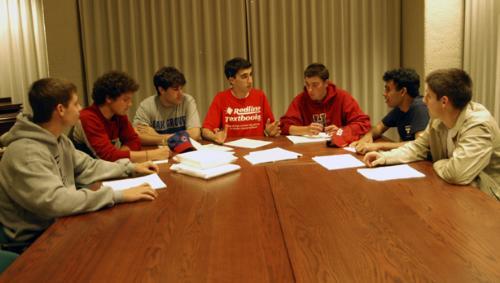
News
Summers Will Not Finish Semester of Teaching as Harvard Investigates Epstein Ties

News
Harvard College Students Report Favoring Divestment from Israel in HUA Survey

News
‘He Should Resign’: Harvard Undergrads Take Hard Line Against Summers Over Epstein Scandal

News
Harvard To Launch New Investigation Into Epstein’s Ties to Summers, Other University Affiliates

News
Harvard Students To Vote on Divestment From Israel in Inaugural HUA Election Survey
Students Sell Books, Cheaper

While searching for a cheaper textbook last semester, Danny F. Yagan ’06 discovered that textbooks overseas were cheap enough not only to save money, but to make some.
“I had heard about huge international price differentials before but I didn’t know how large they were until I was looking for a less expensive way to get my Ec 1011b book,” he said.
The product of his search was Redline Textbooks, a new company Yagan started with seven fellow Currier House residents that takes advantage of substantial disparities in textbook prices at the Harvard Coop as compared to those at other retailers and distributors. The prices set by publishers often vary from country to country, and the new company exploits this fact by buying textbooks required in popular Harvard courses, mostly from Western Europe, and reselling them on campus.
“What’s remarkable is that even with buying retail in Western Europe and shipping overseas, we’re able to offer $20-50 off the Coop,” said Yagan, whose older brother, Sam A. Yagan ’99, founded SparkNotes.com.
Danny Yagan also said that that Redline Textbooks receives some of its stock from domestic sources.
Through its site, redlinetextbooks.com, the corporation offers unused textbooks required in introductory chemistry, physics, math, economics and statistics courses.
With a loan from a private source and approval from the College to run a business out of a dorm during term-time, Yagan started the corporation with Daniel J. Feith ’06, Matthew G. Gartland ’06, Robert M. Koenig ’06, Andrew M. Mugica ’06, Naveen Muthu ’06, Michael W. Reckhow ’06 and Brooks E. Washington ’06.
The professors of some courses already suggest in their syllabi that students visit redlinetextbooks.com in addition to the Coop to buy textbooks.
“We will certainly be suggesting that the students buy the textbook from Redline Textbooks,” said Professor of Economics Edward L. Glaeser, who teaches Economics 1011a, “Microeconomic Theory.” “I belive in free trade and I believe in arbitrage, and I think this is a terrific thing what they’re doing.”
The operators of Redline Textbooks check the site every night at midnight, prepare the textbooks ordered by students and offer next-day delivery.
Washington, the company sales manager, expressed optimism about textbook sales, and said that the company was not operating at a loss overall.
“Over the weekend, even before shopping period, we sold over 60 books,” said Washington.
“It was beyond our wildest dreams.”According to Yagan, they have sold over 100 books to date.
Washington attributed much of the sales to freshmen, whom Redline Textbooks targeted with fliers last week.
The pricing of college textbooks has emerged as a national issue in the past year. In an October 2003 article, the New York Times reported that some textbooks cost half as much when purchased abroad. In July, the U.S. House of Representatives held a subcommittee hearing on the topic, “Are College Textbooks Priced Fairly?”
Allan E. Powell, corporate general manager at the Coop, said that Redline Textbooks, due to its small scale, can exploit international pricing disparities.
“Small operators like the students at Harvard can do this and they stay under the radar screen of the publishers because the publishers don’t want this to be happening,” Powell said. “Online competitors have what we call cherry-picked, the biggest titles and most expensive books. It works for the small operator but it doesn’t work for the larger operator who has a large list like we do.”
Powell also expressed doubt that Yagan and his friends’ efforts would change Coop policies.
“We don’t believe, unless there’s some fundamental change in the way that publishers price their books, that this would have any applicability to United States bookstores,” Powell said.
“I think that what we hope to do is give a lot of students an alternative to the Coop,” Washington said.
“The Coop has every book, and I buy books at the Coop, but for many books, The Coop doesn’t provide the best options and prices.” “In addition, we’re getting a chance to run a business,” he added.
In a partnership with NetAid, a New York non-profit organization which supports local organizations in other countries that fight extreme poverty, Redline Textbooks will also donate 10 percent of its pre-wage earnings to improve access to education in developing countries.
Want to keep up with breaking news? Subscribe to our email newsletter.
